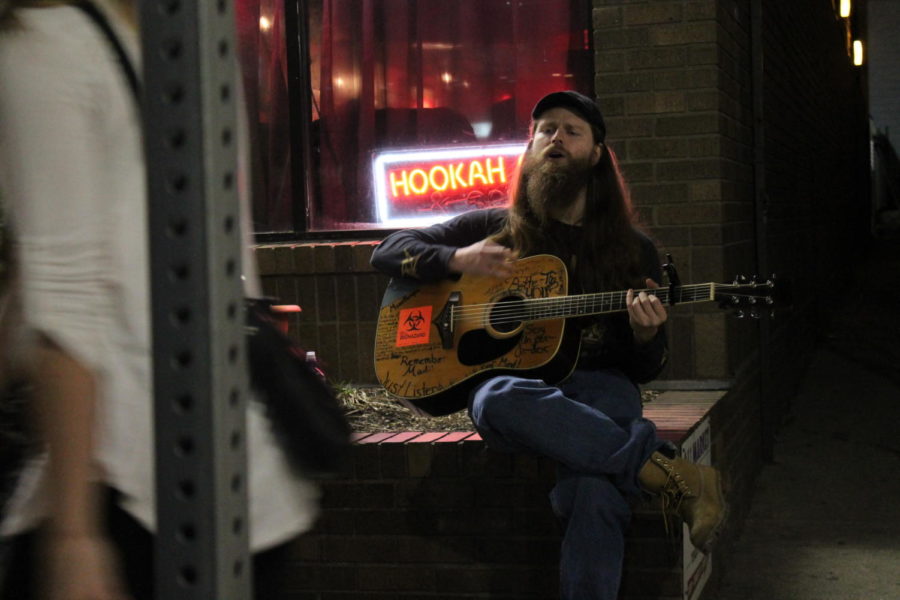Ames street musician scene affected after Veishea incident
Richard Martinez/Iowa State Daily
Mark Simpson, 27, is an Ames resident who started performing on Campustown streets 10 months ago. In Ames, college students, bar patrons and even police officers take notice of the frequent number of musicians who appear on the streets during the weekend.
May 6, 2014
Aside from the usual bustle heard on Welch Avenue over the weekend, in the background, a careful passerby can hear the acoustics of a guitar being strummed in the distance. As the ear follows the sound, the subject becomes clear: a musician nestled on the street, proudly singing to an audience of one or two.
Street performers have gradually withdrawn from the streets because they lack an audience. The riot that occurred in Campustown during the 2014 Veishea festivities was a significant contributor.
Mark Simpson, 27, is an Ames resident who started performing on the streets in Campustown 10 months ago. While he has been a part of a band with friends for over five years, Simpson decided to try street performing to keep the art alive.
“For the most part, people love it,” Simpson said. “I started doing it just because I felt like it would be something fun to do. If it weren’t for the crowds, the people, what’s the point?”
Simpson performs with his acoustic guitar on street corners in Campustown. He frequently sets up on Welch Avenue, Chamberlin Street and Lincoln Way.
During the fall, typically on weekends with ISU football games, Simpson can spend up to six hours performing throughout the night, sometimes staying outdoors until 3 a.m. On these occasions, he can see hundreds of students and receive around $20 in tips.
But on a normal night, especially after the Campustown riot, Simpson said he is lucky to see students by the dozens and receives nothing more than a handful of change.
“I am not a beggar,” Simpson jokes. “I do it for the enjoyment. When I see people smiling, I can’t help to smile. I live vicariously through the music.”
Simpson said the issue he sees that is causing a reduced number in street performers and audiences, is city ordinances.
In most local governments, there is no distinction between musicians performing on the streets — busking — or panhandlers, otherwise known as beggars. Because of this, musicians can easily be mistaken for those trying to illicit money on the street, like beggars or the homeless.
Brian Phillips, management analyst for the city of Ames, said there are rules in place to maintain the ethics of busking in public. Obstructing traffic, loitering in front of businesses and making excessive noise need to be controlled for busking to be permissible.
However, unlike most cities, buskers are not required to have a permit or pay a certain fee to perform. Instead, they are asked to be familiar with the city codes and respect business owners and their respective properties.
John Jenson, 27, is an ISU graduate who also busks in Campustown playing the drums. While he began street performing earlier than Simpson, the two occasionally play together.
“As of right now, the music scene is going down big time,” Jenson said. “While there aren’t many regulations on busking in Ames, I don’t want to see Veishea go away.”
Jenson and Simpson agree that the Veishea festivities attract attention to street performers, and without the event, busking is a tradition that would also be dissolved.
“It’s a shame for a few people to spoil it for everyone else, but it’s going to make a noticeable difference,” Simpson said. “This year alone — I know it’s later in the school season — but it’s still a shame for [street performing] to be a dying art.”
The Veishea Task Force at Iowa State is responsible for the continuation of the festivities in the future. While a decision to keep the tradition is tentative, Jenson and Simpson have decided to split up as Simpson intends to leave Ames with the threat of Veishea being cancelled indefinitely.
As street performers are still encouraged to stay in Ames by the city, several contributing factors deter the retention of both familiar and aspiring buskers.
The motivation to continue the art is regressing in spite of the appreciation that comes from fans and community members, Simpson said.
“You just can’t make a living here,” Simpson said. “As fantastic as Ames treated me, if you want possibilities, right now [and] here isn’t the place for it, unlike other places.”







